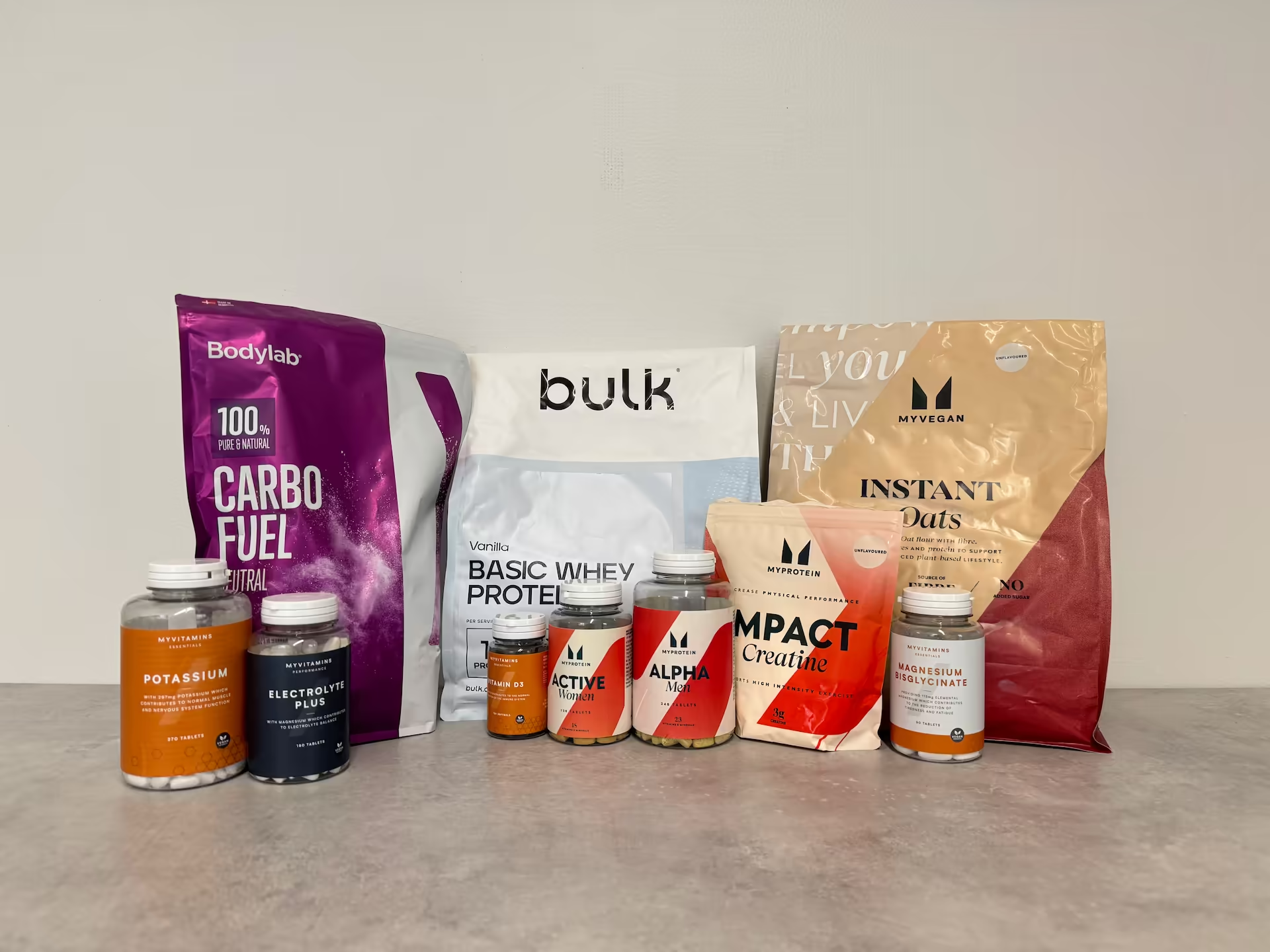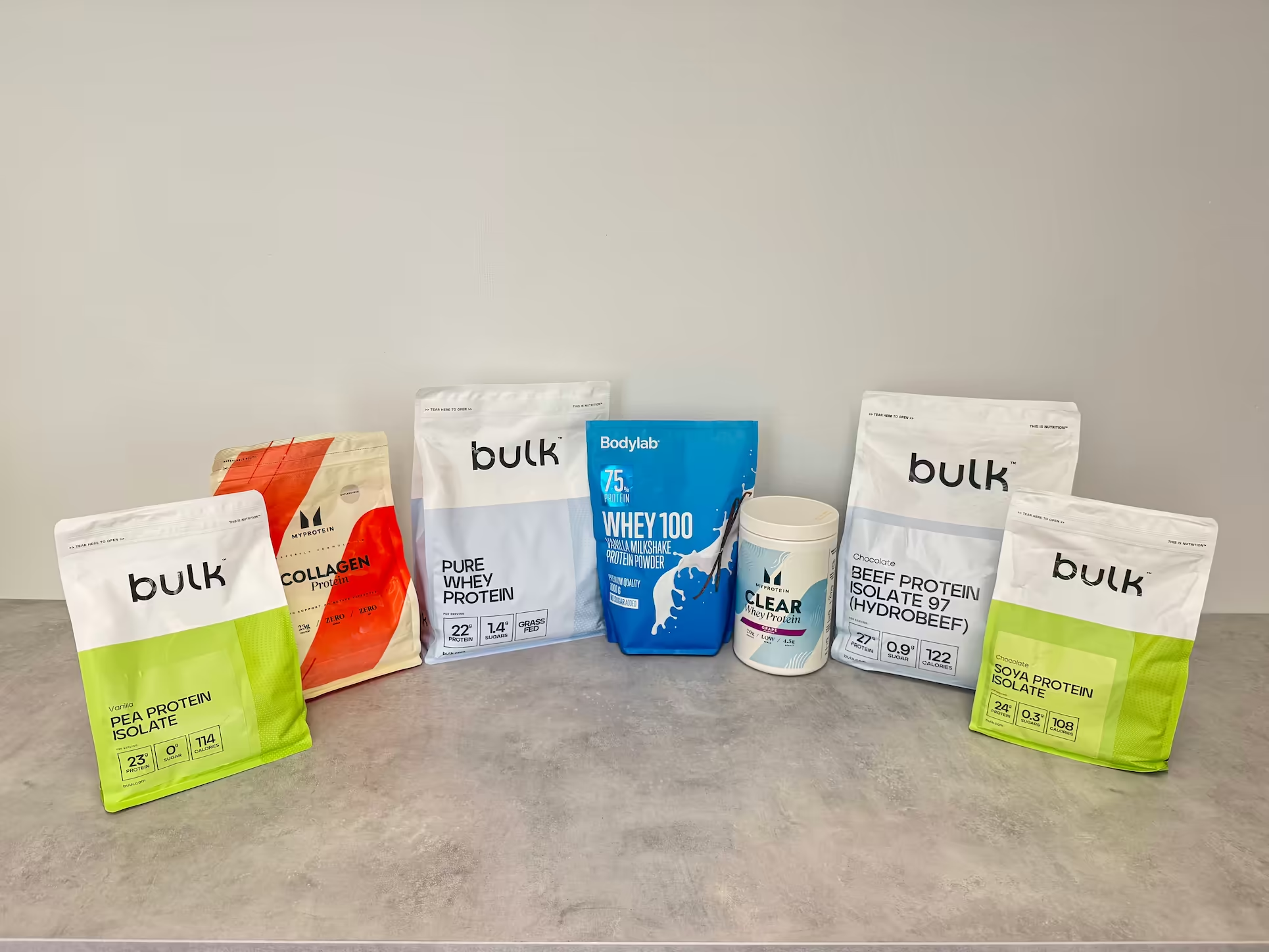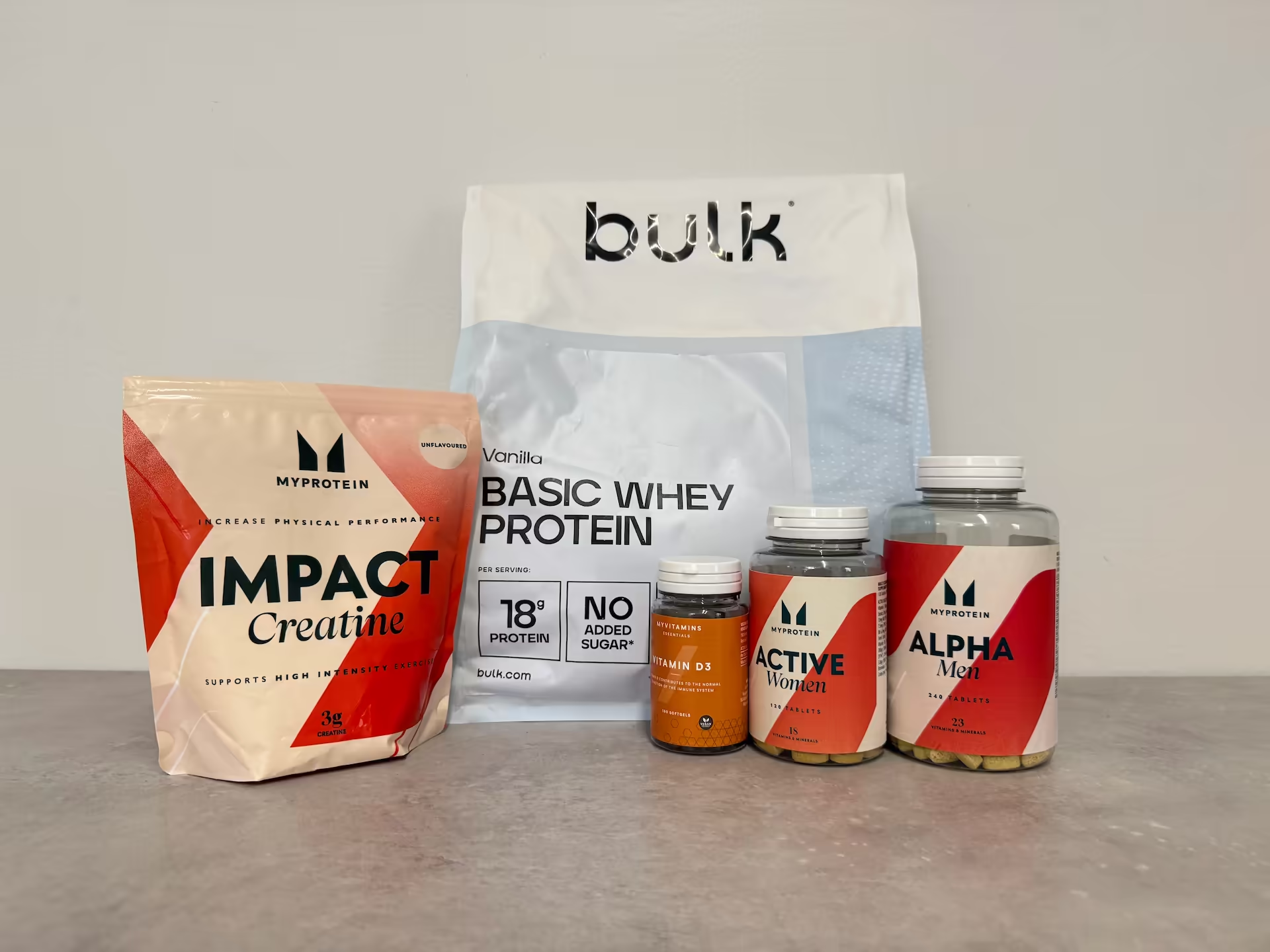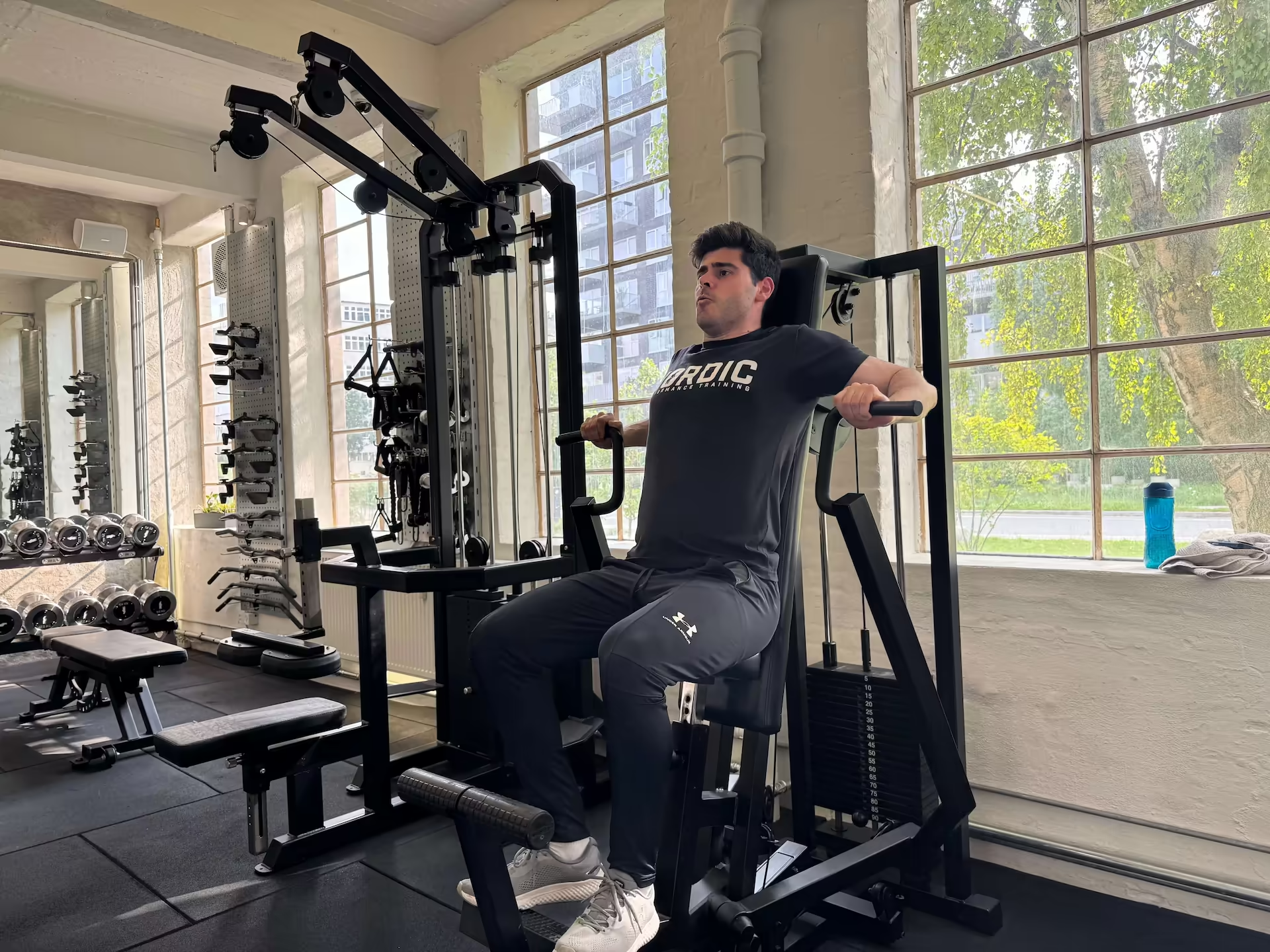5 High-Protein Breakfast Recipes (40g)—Healthy and Filling
With over 10 years of experience as trainers and physiotherapists and more than 3,000 clients at Nordic Performance Training, we know exactly what it takes to start the day right. A high-protein breakfast isn't just a health tip – it's the foundation for stable energy, appetite control, and can even improve body composition.
Most Danes only get 10–15g protein at breakfast (e.g., bread with toppings, oatmeal, or muesli). Research shows that 30–40g protein in the morning provides significantly better satiety, blood sugar stability, and muscle protein synthesis.
Here are 5 practical recipes, each delivering approximately 40g protein – tested and approved by our clients at our private training center in Copenhagen.
What is a high-protein breakfast?
A high-protein breakfast contains at least 30–40g protein from sources like eggs, grains, dairy products, or protein powder.
Why exactly 30–40g protein?
Muscle protein synthesis
Studies show that 25–30g protein maximizes muscle protein synthesis in most adults. We recommend 30–40g to be on the safe side, as there can be uncertainties in food declarations.
Satiety feeling
Protein increases the production of hormones that signal satiety to the brain. 30–40g protein provides lasting satiety for 4–5 hours.
Thermic effect
Protein has a thermic effect of 20–30%, which means the body uses part of the protein calories on digestion. A breakfast with 40g protein (approx. 160 kcal) therefore 'costs' 30–50 kcal extra to digest.
Sources of high-quality protein for breakfast
4 Scientific Benefits of High-Protein Breakfast
Long-lasting Satiety and Natural Appetite Control
Christian's breakthrough experience: Christian, 37, building constructor, often had to be on building sites where eating wasn't always practical. He frequently felt hungry at inconvenient times that didn't fit his work schedule, which affected his focus and energy.
After 4 weeks with protein-rich breakfasts, Christian can now easily stay full and focused until the scheduled lunch break, which also supports his protein needs for his 2 weekly personal training sessions at our private gym in Copenhagen. His performance has increased both at work and in the gym.
"I can easily stay full and focused until lunch now, and it's become so much easier to hit my daily protein needs." — Christian, 37, Building Constructor
Blood Sugar Stabilization
Protein slows the absorption of carbohydrates and prevents large blood sugar spikes. This creates stable energy instead of energy swings with subsequent fatigue.
Muscle Protein Synthesis and Recovery
A protein-rich breakfast kickstarts muscle protein synthesis after the night's fast. This supports both muscle maintenance in regular exercisers and muscle building in those following structured training programs.
While a protein-rich breakfast kickstarts muscle protein synthesis, nothing stimulates muscle growth more than structured high-quality training. See our free training programs in our in-depth Full Body guide.
Improved Body Composition
High protein intake, especially in the morning, supports fat loss and muscle maintenance simultaneously. Combined with strength training, it can significantly improve body composition.
How to Hit 40g Protein in the Morning
Combination 1: Skyr-based
- 300g skyr (~30g protein)
- 15g nuts (~3g protein)
- 15g seeds (~4g protein)
- 10g honey (flavor) Total: ~37g protein
Combination 2: Egg-based
- 3 whole eggs (~18g protein)
- 100g ham (~20g protein)
- 30g cheese (~7g protein) Total: ~45g protein
Combination 3: Protein powder-based
- 30g protein powder (~24g protein)
- 300ml milk (~10g protein)
- 50g oats (~7g protein) Total: ~41g protein
5 High-Protein Breakfast Recipes: Tested by Our Clients in Copenhagen
1. Skyr Bowl with Nuts, Seeds and Berries (38g protein)
Ingredients and protein contribution:
- 300g natural skyr contains approximately 30g protein
- 10g almonds contribute around 2g protein
- 10g pumpkin seeds provide approximately 3g protein
- 10g chia seeds contain approximately 2g protein
- 100g fresh blueberries (minimal protein, but antioxidants and flavor)
- 1 tsp honey (sweetness)
How to make it:
- Pour skyr into a deep bowl
- Top with almonds, pumpkin seeds, and chia seeds
- Add fresh blueberries
- Drizzle honey over and mix lightly
Total macronutrient profile:
- Calories: 420-450 kcal
- Protein: 38g
- Fat: 12-15g
- Carbohydrates: 35-40g
- Fiber: 8-10g
2. Oatmeal with Protein Powder (41g protein)
Ingredients and protein contribution:
- 50g oats contain approximately 7g protein
- 300ml skim milk contributes around 10g protein
- 30g vanilla protein powder provides approximately 24g protein
- 1 ripe banana (sweetness and consistency)
- ½ tsp cinnamon
How to make it:
- Boil milk in a pot
- Add oats and cook over low heat for 5-7 minutes
- Stir in protein powder when porridge is done (avoid lumps)
- Slice banana and place on top
- Sprinkle cinnamon over
Total macronutrient profile:
- Calories: 480-520 kcal
- Protein: 41g
- Fat: 8-10g
- Carbohydrates: 65-70g
- Fiber: 9-11g
3. Omelet with Ham and Cheese (45g protein)
Ingredients and protein contribution:
- 3 whole eggs contain approximately 18g protein
- 80g smoked ham contributes around 20g protein
- 30g grated cheese provides approximately 7g protein
- 1 tbsp butter for frying
- Salt and pepper to taste
How to make it:
- Whisk eggs with salt and pepper
- Heat butter in the pan over medium heat
- Pour in eggs and let them set at the bottom
- Place ham and cheese on one half
- Fold the omelet together and serve immediately
Total macronutrient profile:
- Calories: 420-460 kcal
- Protein: 45g
- Fat: 28-32g
- Carbohydrates: 2-3g
- Fiber: 0g
4. Fluffy Protein Pancakes with Banana (36g protein)
Ingredients and protein contribution:
- 2 whole eggs contain approximately 12g protein
- 30g vanilla protein powder contributes around 24g protein
- 1 ripe banana (sweetness and binding)
- ½ tsp baking powder
- Butter for frying
How to make it:
- Mash banana to puree
- Whisk eggs and banana puree together
- Mix in protein powder and baking powder
- Let batter rest for 5 minutes
- Fry small pancakes over medium heat for 2-3 minutes per side
Total macronutrient profile:
- Calories: 380-420 kcal
- Protein: 36g
- Fat: 12-15g
- Carbohydrates: 30-35g
- Fiber: 4-5g
5. Protein-Rich Overnight Oats with Nuts and Seeds (40g protein)
Ingredients and protein contribution:
- 50g oats contain approximately 7g protein
- 300ml skim milk contributes around 10g protein
- 30g skyr provides approximately 3g protein
- 15g peanuts contain approximately 4g protein
- 15g almonds contribute around 3.5g protein
- 15g chia seeds provide approximately 3g protein
- 15g pumpkin seeds contain approximately 5g protein
- ½ tsp cinnamon and sugar to taste
How to make it:
- Mix all dry ingredients in a glass with lid
- Add milk and skyr, stir well together
- Place in refrigerator overnight (minimum 6 hours)
- Stir well before serving, add extra milk if needed
Total macronutrient profile:
- Calories: 520-550 kcal
- Protein: 40g
- Fat: 23-25g
- Carbohydrates: 45-50g
- Fiber: 10-12g
Calories and Protein in Breakfast Recipes: Complete Comparison
Protein Content in Key Ingredients
Dairy products (per 100g):
- Skyr: 10g protein
- Greek yogurt: 8-10g protein
- Skim milk: 3.4g protein
- Hard cheese: 20-25g protein
Eggs and meat:
- 1 egg (60g): 7-8g protein
- Ham (per 100g): 20-25g protein
Nuts and seeds (per 15g):
- Almonds: 3g protein
- Peanuts: 4g protein
- Chia seeds: 3g protein
- Pumpkin seeds: 5g protein
Practical Tips for Protein Breakfast Success
Meal Prep Strategies for Maximum Efficiency
Sarah's solution: Sarah, project manager with two teenagers, meal preps her breakfasts on Sunday evening. "I make 5 overnight oats portions at once. It takes 10 minutes, and then I have protein-rich breakfasts all week."
Prep-friendly choices:
- Overnight oats keep for 4-5 days
- Hard-boiled eggs can be cooked in advance
- Skyr bowls can be assembled the day before
Budget-Friendly Protein Hacks
Egg vs. protein powder economics:
- 3 eggs: ~6kr, 18g protein = 0.33kr per gram protein
- 30g protein powder: ~10kr, 24g protein = 0.42kr per gram protein
- Skyr: ~25kr/500g, 50g protein = 0.50kr per gram protein
Tip: Combine eggs with cheaper protein sources for optimal economy.
Travel and Quick Solutions
5-minute emergency solution:
- 300g skyr + 20g nut mix = 35g protein
- Total time: 30 seconds
For protein intake supplementation, see our protein powder guide.

Frequently Asked Questions About High-Protein Breakfast
How do I get 40g of protein for breakfast?
By combining 2–3 protein sources. For example: Skyr (30g) + nuts (4g) + seeds (6g) = 40g protein, or eggs (18g) + ham (20g) = 38g protein. Mixing foods is the easiest way to reach your target.
What is the most protein-rich breakfast?
An omelet with 4 eggs, 100g meat, and cheese can reach 60–70g of protein. However, 30–40g is ideal for most people to stimulate muscle growth and recovery.
Are oats protein-rich enough?
No. Oats alone provide only 12–14g of protein per 100g. Add protein powder, milk, or skyr to reach around 40g total.
What has more protein: Greek yogurt or skyr?
Skyr contains slightly more protein — about 10g per 100g compared to 8–10g in Greek yogurt. The difference is small, but skyr has the edge.
Can I eat a high-protein breakfast every day?
Yes. Consuming 30–40g of protein each morning is safe and beneficial for most adults. It supports muscle maintenance, energy, and fullness.
When should I eat my high-protein breakfast?
Within 1–2 hours of waking up. This helps kick-start muscle protein synthesis and keeps you full and energized through the morning.
Does a high-protein breakfast help with weight control?
Yes. Protein increases satiety and calorie burn, making it easier to manage weight as part of a balanced diet and consistent exercise routine.
How to Start with High-Protein Breakfast Today
Immediate benefits:
- Stable energy for 4-5 hours without snacking
- Improved concentration and mental clarity
- Natural appetite control for the rest of the day
Long-term benefits:
- Better body composition
- Support for muscle maintenance
- Healthier relationship with food and satiety
Emma's 6-month result: Emma, marketing manager, implemented protein-rich breakfasts as part of her training and nutrition program. After 6 months: "I've lost 8 kg, but most importantly, I never feel hungry or tired in the morning. My productivity at work is significantly better."
A protein-rich breakfast isn't just a meal – it's the investment in your energy, concentration, and long-term health. Start with one recipe, find your favorite, and build from there – who knows, maybe they can be a catalyst for starting a new morning routine like a morning run (see our running guide).
Ready to build healthy training and nutrition habits once and for all? Book a free start-up conversation where we can help you find a sustainable training plan that fits your life.
References
Schoenfeld, B.J. & Aragon, A.A. (2018). How much protein can the body use in a single meal for muscle-building? Implications for daily protein distribution. Journal of the International Society of Sports Nutrition, 15(1), 10. https://pubmed.ncbi.nlm.nih.gov/29497353/
Helms, E.R., Zinn, C., Rowlands, D.S., & Brown, S.R. (2013). A systematic review of dietary protein during caloric restriction in resistance trained lean athletes: A case for higher intakes. International Journal of Sport Nutrition and Exercise Metabolism, 32(6), 421-436. https://pubmed.ncbi.nlm.nih.gov/24092765/
Kerksick, C.M., Wilborn, C.D., Roberts, M.D., et al. (2018). ISSN exercise & sports nutrition review update: Research & recommendations. Journal of the International Society of Sports Nutrition, 15(1), 38. https://pubmed.ncbi.nlm.nih.gov/30068354/
Related Blog Posts
.svg)
.svg)

.svg.webp)











